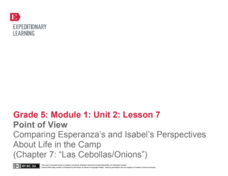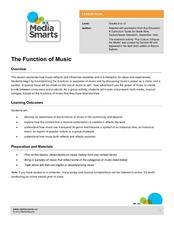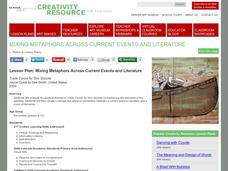EngageNY
Point of View: Comparing Esperanza's and Isabel's Perspectives About Life in the Camp (Chapter 7: "Las Cebollas/Onions")
Explore point of view and more with a Common Core-designed instructional activity. Learners experience different points of view by representing one of two characters from Esperanza Rising during a partner discussion. They must use...
Curated OER
Eating Up Idioms
Ah, food idioms! Now that sounds tasty. Class members read and discuss various food-related idioms, create an illustration of a food-related idiom, and develop a class book or bulletin board to celebrate figurative language and National...
Curated OER
Reliving History through Slave Narratives
Helpful for an American literature or history unit, this lesson prompts middle schoolers to examine slavery in the United States. They read slave narratives that were part of the Federal Writers' Project and then conduct their own...
Curated OER
Let's Go Exploring!
Use a Courbet painting of a cave or tunnel opening to reinforce the importance of descriptive writing. Writers of all ages use sensory details to describe what the scene depicts as they pretend to be in the painting. Then they imagine...
Curated OER
Teaching Julius Caesar: A Differentiated Approach
While the themes of Julius Caesar may appeal to most readers, the act of reading the play can be a challenge. A unit plan related to the popular play by Shakespeare provides lesson plans and activities designed for differentiated...
Curated OER
A Lucky Break
Explore idioms with a chicken theme! Consider doing these activities prior to Thanksgiving, as there's a section about wishbones! First your youngsters will match a short list of idioms with their meanings. Then, give each learner the...
Curated OER
The Function of Music
Explore concepts of audience, purpose and symbols in this lesson from Media Smarts that asks young scholars to consider all the functions of music. Through a series of discussions and activities, your class will brainstorm possible...
Curated OER
Scary Short Story Writing Lesson
There's nothing like the prospect of writing a scary story to get your middle schoolers' writing juices flowing! In the lesson presented here, pupils listen to scary short stories read to them by the teacher. Then, a discussion ensues...
EngageNY
Looking Closely at Stanza 3—Identifying Rules to Live By Communicated in “If”
Just as Bud, from the novel Bud, Not Buddy by Christopher Paul Curtis, had rules to live by, so does the poem, If by Rudyard Kipling, but how do the two relate? Pupils delve deep into the poem's third stanza, participate in a grand...
California Department of Education
Hitting the Write Note: Writing a Proposal
To whom it may concern ... Scholars undergo the process of writing a letter to an authority figure. The activity asks writers to compose a formal letter requesting a music therapy space. Pupils learn how to submit a project proposal to...
EngageNY
Grade 10 ELA Module 2: Unit 1, Lesson 6
Readers determine if this statement applies when comparing the central idea of Ahmad Shamlu's "A Blind Alley" and Martin Luther King Jr's "Letter From Birmingham Jail." Learners analyze the standard related to the central message, listen...
EngageNY
Grade 10 ELA Module 2: Unit 1, Lesson 12
Sticks and stones may break bones, but words matter. Scholars analyze words in paragraphs from Martin Luther King Jr.'s "Letter from Birmingham Jail." They use new vocabulary words and discuss how King's words develop and support his...
EngageNY
Analyzing Poems from Inside Out and Back Again to Develop Criteria for an Effective Poem
Scholars analyze a model poem to help guide their poetry writing. They use Think-Pair-Share to discuss word choice and meaning in "Papaya Tree" and "Wet and Crying." To finish, they use their discussions to collect evidence on what makes...
EngageNY
Grade 11 ELA Module 2: Unit 2, Lesson 13
Two minds are better than one. Learners engage in an evidence-based discussion to identify central ideas in Audre Lorde's poem "From the House of Yamanjá" and one additional nonfiction text. They complete a Cross-Evidence Collection Tool...
EngageNY
Analyzing an Author’s Craft: Carlotta’s Journey to Justice
Find your voice. Readers look at a passage from A Mighty Long Way and discuss what it means for Carlotta to find her voice. After discussing figurative language and idioms, learners listen to the song "This Little Light of Mine" and...
Curated OER
Body Language
Students take pictures in different settings to demonstrate the importance and influence of body language. In this body language lesson plan, students use a camera and work in groups over a 5 week period.
Curated OER
Figurative Language: Metaphors and Similes
Fifth graders are introduced to the figurative language using metaphors and similies. They identify the similarities and differences between the two and practice developing their own to use in their writing. They illustrate their...
Curated OER
Making Inferences While Identifying Similes and Metaphors
Use this lesson to study similes and metaphors and the inferred meaning. In this language arts lesson, 5th graders write their own similes and metaphors. A worksheet is provided for extension work or to check understanding as homework.
Dr. Seuss Enterprises
Dr. Seuss in the Classroom
Explore the works of Dr. Seuss, such as Horton Hears a Who, Horton Hatches and Egg, The Sneetches and Other Stories, The Lorax, The Butter Battle Book, and Yertle the Turtle and Other Stories. Each story lesson includes reading...
Curated OER
Lesson: Mixing Metaphors across Current Events and Literature
Expression, current events, and art can go hand-in-hand. After analyzing a multi-media piece entitled, Trade Canoe for Don Quixote, the class explores their own expressive process. They create collages that show a current event or issue...
Curated OER
Figurative Language
Twelfth graders examine personification and alliteration in various reading selections. They read magazine articles, brochures, and advertisements, identify the examples of personification and alliteration, and create a business name...
Curated OER
Blanket the Plains
Learners discuss vivid imagery in a story. In this figurative language lesson plan, students read samples of sensory language and then discuss the meaning of a piece of figurative language. Learners provide examples.
Curated OER
My Secret War: Lesson 1
Fifth graders explore historical fiction. In this genre study lesson plan, 5th graders go on a text feature scavenger hunt to identify the parts of a historical fiction text. Additionally, students read the book, My Secret War and...
Curated OER
Reading the Play
Do figures of speech enhance a play or story? In small groups, learners locate and describe figures of speech they find while reading a reader's theater play. After making predictions, they describe how the figures of speech make the...

























